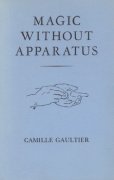Magic Without Apparatus
Overall customer rating: ★★★★★reviewed by Christopher Reynolds (confirmed purchase)
Rating: ★★★★★ (Date Added: Saturday 29 April, 2023)
 Camille Gaultier was a French lawyer with a doctorate in law who later pursued a career as a full-time magician. He lived from 1872 to 1943. "Magic without Apparatus" is the English version of his 1914 book "La Prestidigitation sans Appareils."
Camille Gaultier was a French lawyer with a doctorate in law who later pursued a career as a full-time magician. He lived from 1872 to 1943. "Magic without Apparatus" is the English version of his 1914 book "La Prestidigitation sans Appareils."
Since its initial U.S. publication in 1945, "Magic Without Apparatus" achieved instant success among English-speaking magicians as one of the leading resources for advanced sleight-of-hand knowledge. Translated by author and magician Jean Hugard, it presented written and illustrated entries on performing everything from card and coin sleights to manipulating thimbles and billiard balls.
Professor Hoffman (author of Modern Magic) wrote:
"A contribution of the first rank to the literature of the subject. ... The book may fairly claim to contain the best sleights of the most finished performers, many of them never, till now, described in print. ... To the serious magician, the man who aims at becoming a master of his art, the information here given should be of the highest possible value."
Leo Rullman was a book dealer, Deputy Collector of the Port of New York. He was a skilled juggler and amateur magician. Rullman was known for his appreciation of magic literature. He once praised "Magic Without Apparatus" as "the greatest work on pure sleight-of-hand in any language."
This book contains a collection of the most effective methods for performing sleight-of-hand tricks, compiled from the works of famous magicians like Howard Thurston, Harry Houdini, August Roterberg, Charlier, Felicien Trewey, Chung Ling Soo, and others, including the author. This is an invaluable resource for those who are fascinated with sleight-of-hand conjuring.
For history buffs such as myself, the 58-page introduction was alone worth the price of the (e)book. Gaultier begins by discussing the influence of French conjurers (like Alexander Herrmann, Robert Houdin, and Buatier de Kolta) in magic history before reviewing early French conjuring literature and describing the types of magic performed in the seventeenth through early nineteenth centuries.
The initial section of the book covers playing cards, containing various techniques with in-depth explanations beyond what a typical magic learner may have previously encountered, including five methods of false shuffling, eleven for making the pass, fifteen for avoiding the use of the pass, five ways to force cards, fourteen methods of card palming, thirteen card changes and substitutions, and seventeen "color changes" with cards.
Part Two of the book delves into coin magic. It's structured similarly to Part One, covering the fundamental techniques used in coin conjuring. Overall, there are 55 essential sleights to learn, including 14 methods for coin palming, 36 ways to make coins disappear, and 5 methods for coin transformation.
Part three thoroughly covers billiard ball sleights and tricks, while part four focuses on sleights and tricks using thimbles.
This book is exceptional as a reference for pure sleight-of-hand as it offers an unparalleled and comprehensive treatment. Over the past decade, the art of magic and illusion has significantly progressed, particularly with playing cards. However, magic enthusiasts may find the techniques presented in "Magic Without Apparatus" moldy and unappealing. It's a shame that some may dismiss it as outdated.
Modern performers need to appreciate the roots of their art form. They shouldn't live in an artistic vacuum with only the latest YouTube videos. Neglecting the history of their craft, they limit their creativity.
Spend the time reading Magic Without Apparatus, remembering that you're a link in a chain that spans back to antiquity. There is no such thing as an "old" sleight or trick, only forgotten ones ready to be dusted off and taken out of retirement.
As the saying goes, "If you don't know your past, then you won't know your future."